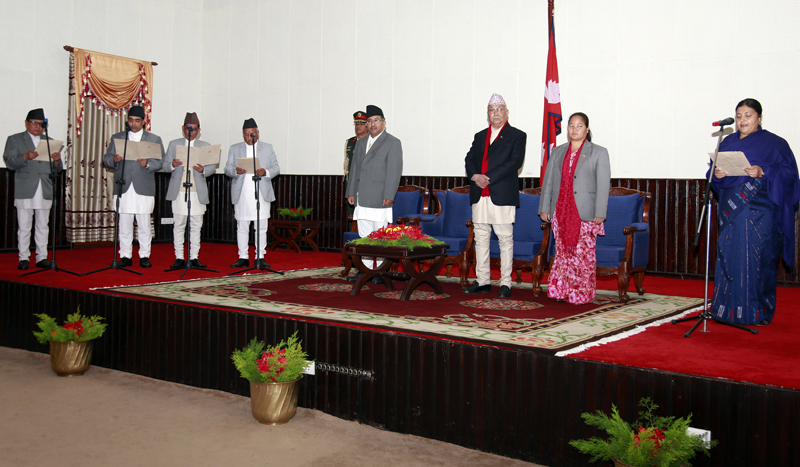Experts liken jumbo Cabinet to ‘goitre’
Kathmandu, December 26
Experts said the KP Sharma Oli-led government’s recent decision to add four new ministries cannot be justified in any way. They said the move was only aimed at fulfilling personal interest and prolonging the life of the government.
At a time when the country is preparing to enter the federal structure by decentralising power, increasing the number of ministries is against federalism, the experts said, adding, “It shows the government lacks commitment to implement the new constitution and is unwilling to execute federalism”.
As the government will have to downsize to 25 ministries after the transition is over and implementation of federalism begins as per the constitution, increasing the number of ministries at this point is an unnecessary burden, they said.
The move has drawn criticism from within the ruling CPN-UML and Unified CPN-Maoist and the main opposition Nepali Congress. They have termed it the beginning of the Oli-led government’s fall.
Instead of downsizing the number of ministries to follow the spirit of the constitution, the government on Thursday and yesterday created three new ministries – Population and Environment; Water Supply and Sanitation; Livestock Development Ministry and split the Ministry of Commerce and Supply into two separate ministries – Ministry of Commerce and Ministry of Supply.
Excessive recurrent expenditure ranging from three to six billion rupees annually, difficulty in setting up auxiliaries for the new ministers, possible work overlap and lack of inter-ministerial coordination will be the consequences, experts said.
Former chief secretary Leelamani Paudyal said it will take at least six months to set up basic auxiliaries for the new ministries and more time to make them function. Besides, the state will have to face unnecessary expenditure and many other bad consequences.
The consequences, according to Paudyal are: conflict among staffers of ministries; difficulty in managing building, rooms, furniture and staff; division and uncertainty in the ongoing programmes and large amount of recurrent expenditure.
“Each ministry will need basic department such as planning, monitoring, budget, administration and accounts. So, increasing the number of ministries when the country is on the verge of embracing federalism cannot be justified in any way,” Paudyal said. This shows lack of moral strength in the political leadership and tendency of compromise for the sake of power, he said.
Administration expert Professor Bhim Dev Bhatta said, “It is irrational to create new ministries. Rather, it makes a mockery of administrative reform, implementation of new constitution and adoption of federalism. It will further centralise the administrative; prove expensive and it will be difficult to maintain inter-ministerial coordination.”
This government seems to have taken the administration very lightly and thus the decision is the first sign of government’s failure, Bhatta said.
Former chief secretary Bimal Koirala said, “Ministries are split when the country has an immense need to execute development programmes. There is a system of conducting organisation and management survey while adding even one position in government service, but the decision to add four ministries came without any assessment. It will be unfortunate for the country’s long term future.” A slim centre, coordinative provinces and strong local bodies are the major bases of federalism, however, the government’s decision has come as a ‘goitre’, Koirala said.
CPN-UML leader and former minister of General Administration Lal Babu Pandit said this decision seems to have been taken to fulfil personal interests by keeping the country in a trap.
“At one time, the tendency was to open a new political party to get telephone line. Now, many parties have been born just to secure ministerial berths. The government’s recent decision supports this tendency,” Pandit said.
Stating that both the Administrative Reform Recommendation Commissions and committees set up at different times had recommended only 18 ministries before the implementation of federalism and only 12 after federalism is implemented, Pandit said, “The first UML government led by Manamohan Adhikari had a 13-member cabinet, now we have 40-member cabinet.”






